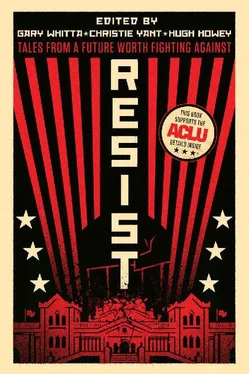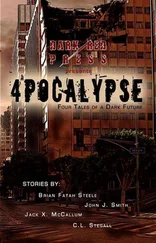“We’re moving,” our daughter says, clapping her hands in excitement. “Let’s go! Where are we going?”
She is not a baby anymore. Our wife starts to cry.
“How did that happen?” our wife says. She starts to turn her head back, hoping she might still be able to see the point in the track where our baby turned into a kid who could say things to us, but we stop our wife from looking back, reminding her that the voice will be angry.
Our car moves down the track. We are picking up speed. We are approaching a house. Our daughter asks us if that is our house and we say we aren’t sure, but something tells us that it is. We are headed for a collision, but then a set of double doors opens and we find ourselves inside the living room of our house.
“This feels like home,” we say to each other, but we also hear other people around us saying it and for the first time in a long time we are aware that we are not on this ride alone. In fact, there are other families in the neighboring cars just ahead of us and just behind us, sitting so close we could reach out and touch them. We look ahead and see that it is all families, all the way down, this tram being an endless procession of small car units, all of us connected by the central drive-train powering this ride, subdivided but linked, having our own versions of the same experience. There is a lot of murmuring now as we hear a lot of us saying “Is this home?” “Where are we?” and we start to wonder what we are, exactly, whether up to this point our definition of “we” has been too small. We wonder who we are. But just as we are starting to wonder about how large “we” are as a group, the nature of “we” and the mystery and the wonder and the pluses and the minuses of it, we hear someone say “I don’t know about this.” We have an “I” among us and everyone turns to see if they can figure out who it is, but just as that happens, the tram uncouples from itself and breaks into two, and one part of us goes off on one track and the other part goes off on a different track, and the uncoupling happens again and again and again until we find ourselves alone, together, alone. Together as a small family unit, but now uncoupled from our fellow riders. Alone now, moving in our single transport vehicle, on our own ride, wondering what we are missing out on, what other riders are getting to see.
Now we wish we had paid more attention at the beginning of the ride, had not been listening to the voice to keep looking sideways, at the murals and the dioramas and displays of the ride’s retail partners. But it was hard not to do so. They make it so easy, we did not even have to move, just take out our credit cards and hold them near the edge of our car in such a way that they could be swiped through the many point-of-sale devices installed every fifty feet along the ride, millions, billions of transactions occurring every instant, so that we could instantly own a part of this experience, if we wanted to, to have souvenirs of all types, cultural, historical, key chains and cups with crazy straws. It was part of our duty as riders to help support the sponsors that make the ride possible, and it allowed us to participate, each according to our means and personalities, allowed us to choose how we wanted to enjoy this, all of this. We pass through the house, seeing our living room, our three bedrooms and two and a half bathrooms, our kitchen, and we exit back out into the light and what we see is a thousand different tracks, or a million, or four hundred million.
“The ride is broken,” our son says.
“Hey!” we say. “We have a son?” and we kiss him and squeeze his cheeks and he pushes our hands away.
“I’m not a baby,” he says.
“You’re not,” we say, because he’s not, but we wonder. “When? How? Where were you born?”
“Back there,” our son says, “in the house. You guys seemed really freaked out about something and I didn’t want to bother you so I’ve been quiet for a while,” and he doesn’t seem too hurt, already so grown-up and used to being the younger kid, and although we feel like we just met him a moment ago, he has been with us for some time now and we already love him. He is ten, our son, and we look at his hair and his nose and his shoulders and we admire him. Our daughter, now thirteen, seems to have known he was here all along and is waiting for us to catch up.
“What are you looking at?” we ask our new son.
“Cars.”
“They’re nicer than ours,” we say. “Our car is old, huh?”
“Yeah,” he says. “But I like our car. It’s the best one.”
All of the cars move along their individual paths, some up into the mountains, some turn into boats and float onto lakes, some take off like airplanes as we watch in envy, some hit trees and we watch the families inside get out and start fighting and we wonder if they will ever be able to get back on. Our car continues smoothly along its track, not the fastest, nor the slowest.
We notice now that the ride is not what it used to be, less finished, more construction. We see a sign posting notice that the ride is now owned by American Enterprises, LLC, whose parent company, American Entertainments, Inc. is a subsidiary itself of a company called The USAmusement Corporation, which is owned by a German conglomerate, New World Experiments GmbH, owned by a consortium led by Chinese and Korean investors.
You have been chosen as potential partners in an affiliate marketing and peer-advertising campaign…
the voice says, as we continue to roll on through history.
You’re now passing through: Japanese internment camps during the Second World War.
On your left, coming up, you will see Coney Island, Brooklyn, New York in the 1920s.
And if you look over to your right, you’ll see the banks of the Mississippi, and, watch your feet, lift them up to stay dry, as your vehicle is now converting itself into a riverboat, a form of transportation vital to the nation’s commerce throughout the 19th century. No mention of other parts of the U.S. economy in that century.
Backward we go, through American lore and mythology, merchandised to perfection.
We see new ground being broken, dig sites surrounded by chain-link fences, men working in hardhats, large colorful banners proclaiming that The American Experience will be re-launched in the fall of 3015.
This is a part of the ride that seems like we are not on a ride anymore.
We have crossed some line into the backstage area, employees only, where the gears and the machine room and the electrical cords and all of the nuts and bolts of the mechanical ride are evident. Even the voice has dropped some of the theatre from her voice and now talks to us directly.
“The narrated portion of the ride is over. You are now entering an experimental phase, still in testing, for a 3-D version of America, where riders can experience “America” for the first time, in 3-D.”
Our son and our daughter both get excited at the idea for a moment until the voice tells us that we do not qualify financially for that portion of the ride.
“You are welcome to stay in the car, although what you will see will be a flattened, 2-D version of what should be a stereoscopic experience.”
We are given a choice of whether to go on or get out, and we decide to go on, although the voice now also tells us that we need to take some of the things out of the car, as we have taken on too much weight, so our son drops his sack lunch over the side of the car, and we drop a typewriter, and old clothes that the kids used to wear, and our daughter drops a doll whose hair she used to brush when she was a little girl at the beginning of the ride.
We are just content to keep riding this for a while, passing through a room they called Your 30s, which has upbeat, contemplative acoustic guitar music, and Your 40s which is more piano-themed, and Your 50s which has Bach playing and we see some cars getting wine and cheese. We see cars that have God with them, in voice and as a kind of hologram, and we watch God from afar, and wish we could hear what God is saying to the people in the cars lucky enough to have God, but the advertising voices all around our car are drowning everything out. We pass through dioramas of ourselves in cubicles, watching time-lapse movies of ourselves working, working, aging, seeing what we look like at work, seeing how the hands of the clocks in our offices spin around, and somewhere around that point we notice that our lap bars have tightened over our thighs. It could be the slow spread of middle age, and the growth of our daughter, who is in college now, and our son who as a sophomore made the varsity soccer team at his high school and is now taller than all of us.
Читать дальше











